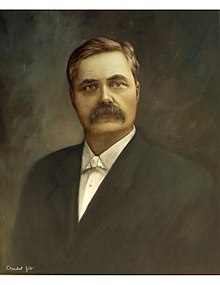Napoleon B. Broward
| Napoleon Bonaparte Broward | |
|---|---|
 |
|
| 19th Governor of Florida | |
|
In office January 3, 1905 – January 5, 1909 |
|
| Preceded by | William S. Jennings |
| Succeeded by | Albert W. Gilchrist |
| Personal details | |
| Born |
April 19, 1857 Duval County, Florida |
| Died | October 1, 1910 (aged 53) Jacksonville, Florida |
| Political party | Democratic |
| Spouse(s) | Georgiana Carolina Kemp Annie Isabell Douglass Broward |
Napoleon Bonaparte Broward (April 19, 1857 – October 1, 1910) was an American river pilot, captain, and politician; he was elected as the 19th Governor of the U.S. state of Florida from January 3, 1905 to January 5, 1909. He was best known for his major project to drain the Everglades to recover land for agricultural cultivation. As governor, he built alliances with the federal government to gain funds for this project.
He had previously served as the sheriff of Duval County, Florida, and in the Florida House of Representatives. He was allied with the Straightouts, Populist-leaning elements of the Democratic Party in the state.
Broward spent his childhood on a series of family farms along the St. Johns River in Jacksonville; during the Civil War the original farm was burned by Union troops that occupied the town. After the war, the Browards had a tough time getting back on their feet. Napoleon's parents both died when he was still quite young. He and his brother tended the family farm for a few years before moving into the city with their uncle.
Broward first worked on the river with this uncle, doing odd jobs during the summer on his uncle's steamboat during the summer. In 1876, having graduated high school, Broward became a ship's mate and traveled to New England. He stayed in that region for two years, working on ships up and down the New England coast.
After gaining this experience, he returned to Jacksonville in 1878 and took a job working tugboats on the St. Johns River. He got to know many of the captains and shipping operations.
Broward married his captain's daughter (Georgiana Carolina "Carrie" Kemp) in January 1883. That spring he applied for a license to pilot ships over the St. Johns Bar, a constantly shifting sandbar that stretched across the mouth of the St. Johns, sometimes above water and sometimes many feet below. Piloting ships over the treacherous bar was quite lucrative.
...
Wikipedia
